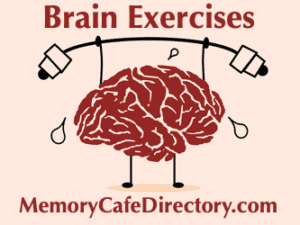Memory Cafe Directory posts and/or links to retailers can be advertising, sponsored, or affiliate links. We may earn a small commission from them. Thank you.
Guest Contributor: Angela George
We know how important physical exercise is to keep the human body healthy and safe from developing diseases. It provides strength, improves functionality, and overall quality of life. Similarly, brain exercises keep the mind healthy. It helps the brain focus, benefit in functionality, and boost memory.
Brain Exercises are Important at All Times
In these COVID-19 times, brain exercise is more important than ever. Our routines have changes, schedules disrupted, the whole life turned upside down, and we aren’t as productive as we used to be. Like the saying goes “use it or lose it,” scientists believe this saying applies to brain health. Where daily mind exercises help the brain cope, it is highly beneficial in avoiding diseases like dementia.
In the lockdown, when you have some free time up your sleeve, you could sign up for brain exercises without even costing you a dime. By this, we do not mean you to engage in apps and computer games that claim to enhance cognitive functions. Research shows that cognitive computer training does not particularly have any positives effects on brain performance.
Experts recommend trying real-world activities to improve cognitive function and boost memory. You can start with the morning newspaper, reading your favorite column, playing a crossword, learning a new language, or trying out a new skill. In this article, we will tell you about 11 effective brain exercises to help improve your memory.
1 Build your vocabulary
When reading a book or watching a TV show, note down the new words you come across and later look them up in the dictionary. There are several sites and apps through which you can subscribe to a “Word of the Day” feed. It will alert you on your cell phone and you’ll get to learn a new word and its meaning every day.
Having a rich vocabulary will make you sound smart as well as have a rather positive effect on brain functioning. Research tells that several regions of the brain that are critical for visual and auditory processing are involved in vocabulary tasks.
2 Try your hand at a new skill
Is there something you have been wanting to try for a while but haven’t yet? Now is the time to start working on learning a new skill. Be it a musical instrument, photography, painting, or anything else. Pick a particular task and research your way through it. There are plenty of tutorials on the web regarding almost everything.
This will not only help enhance your memory but will also help pass time in the lockdown at home. A study conducted in 2014 suggests that involvement in new skills helps improve cognitive function, especially in older adults.
3 Meditate
Meditation is a practice widely adopted in many cultures around the world to reduce stress, increase calmness, and create a sense of inner harmony. Mindfulness meditation though comes from ancient Buddhist traditions; it is all the rage these days.
In mindfulness meditation, you concentrate on your thoughts. You focus on your thoughts and observe them as they pass through your conscious mind. The task is not to engage with them and note any patterns that may occur. Concentration combined with self-awareness will help you achieve peace as well as help increase the brain’s ability to process information.
You do not need a teacher to help you guide. Mindfulness meditation can be practiced alone at home by oneself.
4 Play Sudoku or Crosswords
Trying a number of puzzle games is a good way to challenge your brain. As it will be a fun activity for you, it will also stimulate the brain resulting in improved cognitive function. A study from 2011 shows in people with preclinical dementia, crossword puzzles help delay the onset of memory decline. Another study suggests engaging in puzzle games activates many brain functions including perception, working memory, mental rotation and reasoning.
|
|
5 Find & Learn Memory Joggers

Several pieces of research show keeping your mind active helps boost memory. In the early stages of dementia, keeping one’s brain busy through games, puzzles and other brain training activities helps slow the process of memory loss.
Memory Joggers is a FREE brain exercise from Memory Cafe Directory to strengthen the memories of an individual by challenging the mind to complete the given information. It can be done visually through placards or verbally by assigning the person a Memory Jogger to complete. Idioms and clichéd sentences make for pretty good Memory Joggers. Look for new things to remember and keep challenging your mind.
6 Engage in a Card Game
As much as card games are interesting and fun, they keep the person on edge. Requiring attention at all times, they demand improvisation which stimulates the brain. If you haven’t already reached for the deck, do it now!
A card game is a great way to keep you busy in the lockdown while exercising your brain to strengthen memory. Studies prove participation in cognitive stimulating activities affects immensely on brain functionality.
7 Learn a New Language
It’s never too late to learn or try something new. Here, we urge you to take up the task to learn a new language. However useful it is professionally to know more than one language, it is highly helpful on a personal level as well.
Numerous studies state that “Bilingualism” strengthens connectivity between different areas of the brain which plays a major role in delaying the onset of different forms of dementia. It also contributes to better memory, improved visual-spatial skills, and higher levels of creativity. Listening to another language stimulates the brain and enriching your vocabulary proposes a reduced risk of cognitive decline.
8 Engage in a Physical Activity
How long you have been procrastinating exercising? Now is the time to take out those gym clothes sitting at the back of your cupboard that you bought long ago. Be it exercising, a new sport, or even dancing: pick an activity as you wish and start today.
Physical training has a significant effect on the body as well as the mind. A published research indicates that physical activity helps improve three aspects of brain health, that are memory, cognition and motor coordination.
9 Challenge your Senses
Involve yourself in activities that utilize all of your senses. A research report suggests that using multiple senses in completing a task helps strengthen the brain resulting in improved memory. There are several things to do out there that require using different senses.
For example, try your hand at cooking or baking a batch of your favorite cookies. Cooking is the most common task that will make you use all the senses. When you whip the batter you feel the texture, taste it to make sure it has the right amount of ingredients. When you put it in the oven, you hear the crackling sound of batter baking and the sight of freshly baked cookies is nothing but divine.
10 Visualize More
Visualizing means making a mental image or a series of images that represent information. It is done to plan and organize information of a task that you are about to begin. Supposedly, you are planning on organizing your bookshelf; you make mental pictures of where you are going to start from and how you want each shelf to look like when you’re done decorating.
As much as visualizing helps in completing a task, a review report indicates that it positively impacts the cognitive functions of the brain.
11 Test your Recall
Recall test is a practice in cognitive psychology to test the memory by giving the participant a list to memorize and after a certain period of time, are asked to remember as many things on the list as they can.
You can practice this test at home with a grocery or things to do list. Read it once and try to memorize it. An hour later, see how many items can you recall. You can also add different items to make the test challenging and stimulate your brain.
The Bottom Line on Brain Exercises
The above mentioned exercises can easily be incorporated into your daily lives and won’t take much of your time. Pick the exercises that interest you the most and stimulate your brain. These exercises will not only improve your memory but also help you concentrate, focus, and enhance mental agility. Take the first step towards a brain healthy lifestyle and learn new things along the way.
Angela George

Angela George
Angela George is a community manager at ApparelnBags.com by profession and a blogger by passion. Her love for creating video content makes her try new things.
She also loves to travel and likes to share her experiences with audiences through her blogs.
Become a Contributor!
 Do you want to be a Memory Cafe Directory contributor? If you have helpful information to share with our community, read about the guidelines, then get in touch to discuss what you have to offer.
Do you want to be a Memory Cafe Directory contributor? If you have helpful information to share with our community, read about the guidelines, then get in touch to discuss what you have to offer.
Thank you.










